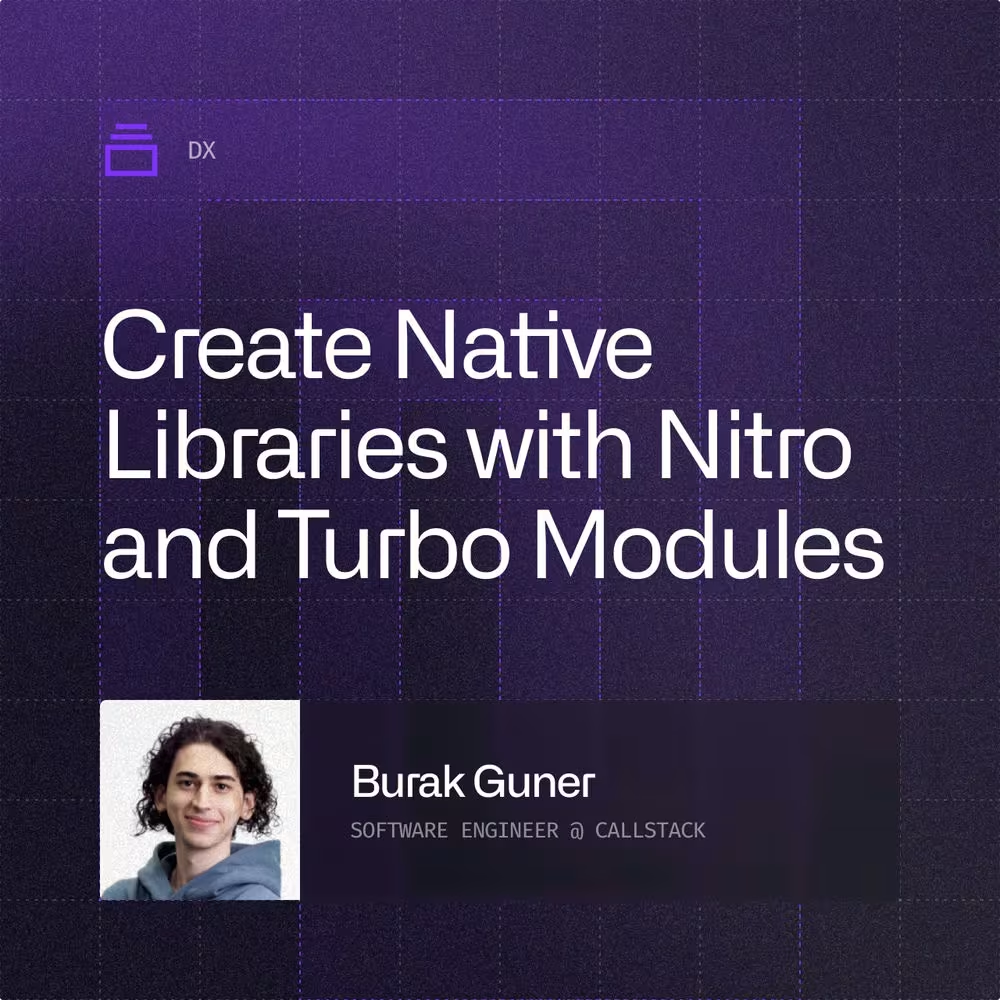
Build high-performing native modules for your React Native app














We help teams extend React Native with native modules that meet demanding performance, integration, or device access needs. Whether you're offloading complex logic or bridging to platform APIs, we ensure your native code works reliably within your JavaScript app.


Why you should build native modules for React Native application
Some use cases require native performance, deeper system integration, or access to APIs that React Native doesn’t expose. Native modules unlock that functionality without compromising on React Native’s productivity.
Maximum performance
Offload heavy workloads like encryption, video, or background tasks to native code, especially when you need consistent performance under load.
Maximum performance
Offload heavy workloads like encryption, video, or background tasks to native code, especially when you need consistent performance under load.
Device-capabilities
Access APIs not exposed by React Native or third-party packages. Integrate directly with sensors, hardware, or platform services.
Device-capabilities
Access APIs not exposed by React Native or third-party packages. Integrate directly with sensors, hardware, or platform services.
Native SDKs
Wrap native SDKs and expose a clean, typed JavaScript interface for use in your app.
Native SDKs
Wrap native SDKs and expose a clean, typed JavaScript interface for use in your app.
Dedicated React Native SDK for Rive's animation engine
Rive partnered with Callstack to bring their animation engine to React Native through a cross-platform library that wraps their native iOS and Android SDKs. The result: a public, community-ready package with automated releases, a typed API, and full platform support.

What should you watch for when building native modules?
Building native modules isn’t just about writing native code. It requires proper interop, memory management, and tooling alignment. These are the most common pain points we help teams handle.
Memory leaks
If native resources aren’t released properly, they stay in memory even when no longer needed. This can slow down the app or cause it to crash, especially on lower-end devices.
Optimization
If a native module runs on the wrong thread or moves too much data at once, it can freeze parts of the UI. Small mistakes here can hurt performance instead of helping it.
Performance overhead
Just writing native code doesn’t guarantee a faster app. Without measuring impact and optimizing implementation, native modules can add complexity and no actual performance gain.
Development speed
Native modules require knowledge of platform-specific APIs, build systems, and memory management, slowing down development without the right support.
Unifying native platforms
iOS and Android often expose similar capabilities through completely different APIs. To make a native module useful in React Native, you need to unify them behind a single interface.
New Architecture support
TurboModules and Fabric require a different setup. Supporting both architectures adds complexity, and switching entirely can introduce breaking changes if not handled carefully.

Learn how to easily create native libraries with TurboModules
This guide explains how to build native modules for React Native using modern APIs like TurboModules and NitroModules, covering real-world challenges and how to solve them with the right tooling.
- When and why to use native code in a React Native app
- Differences between Native Modules, TurboModules, and NitroModules
- How create-react-native-library simplifies boilerplate and supports the New Architecture
Extend React Native with custom native capabilities
Build dedicated modules for your application
We build high-performance native modules tailored to your app’s needs-whether you're accessing platform-specific APIs, optimizing critical paths, or integrating low-level features React Native doesn't expose.
Create dedicated React Native wrappers around native SDKs
We wrap native SDKs with a consistent JavaScript interface, ensuring compatibility across platforms and React Native versions, while handling lifecycle, threading, and memory management for you.
Publish and maintain React Native packages for your organization in Open Source
We help you build reusable native modules ready for Open Source, complete with documentation, CI setup, versioning, and upgrade strategy, so your team or community can adopt them with confidence.

Why leading companies work with Callstack
Meta Official Partners
We are official Meta partner for React Native, co-organizers of React Conf and hosts of React Universe Conf.
Working at scale
We know how to make React Native work at enterprise scale, both technically and organizationally.
React Native Core Contributors
We don’t just use React Native to build cross-platform apps, we help shape it for millions of developers.
Team at scale
We’re a team of 200+ engineers ready to start fast and scale with your needs.
Enterprise-friendly
We hold ISO certifications and follow strict security standards to make onboarding smooth and compliant.
Wide range of services
As a partner for your full application lifecycle, we offer a full range of services around React and React Native.

FAQs
Here’s what teams usually ask when planning, building, or maintaining native code alongside React Native.
You need a native module when there’s no JavaScript or existing React Native library that exposes the platform API, SDK, or performance level your use case requires.
Yes, but React Native’s legacy architecture favors Objective-C and Java. To use Swift/Kotlin effectively, especially with TurboModules, you need the right setup and tooling to avoid boilerplate and compatibility issues.
Native Modules are legacy; TurboModules are faster and JSI-based; NitroModules improve ergonomics and support Swift/Kotlin better. We choose the right API based on your app’s requirements and architecture.
TurboModules are part of React Native’s new architecture and offer major benefits. They’re not strictly required yet, but increasingly preferred, especially for new modules and future-proofing.
Yes, our implementations provide a unified JS API while handling platform differences under the hood. We ensure consistent behavior and test coverage across both platforms.
Both are possible. We support teams who need fully documented open-source packages as well as those building private modules for internal use or proprietary SDKs.
Yes. When performance or logic can be shared, we write parts of the module in C or C++ and expose it to both platforms through their respective build systems. This helps reduce duplication and keeps behavior consistent.
Need help with Native Modules?
Whether you're wrapping a platform SDK or building performance-critical features, we can help you ship robust, maintainable native code for React Native.
We’ve helped dozens of teams go cross-platform without rewriting everything. Let's see how we can help you.
